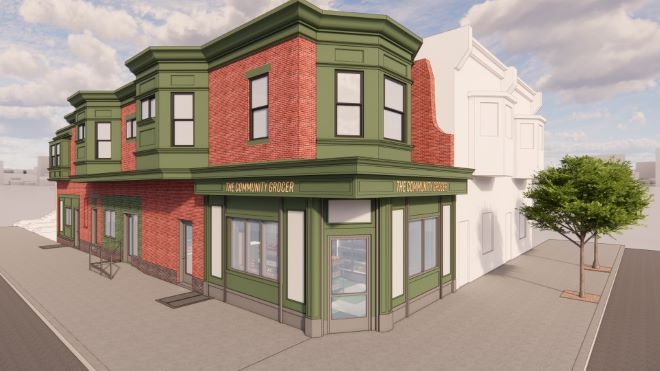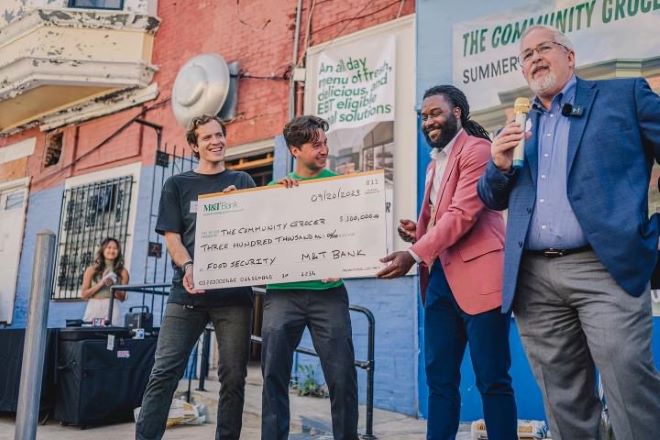When Charles Reeves, Jr. was growing up in Grays Ferry in the 70s and 80s, his family relied on food stamps. About once a month, his mother would travel from their neighborhood to a grocery store about two miles away to buy fresh ingredients. The rest of the time, Reeves and his siblings used the stamps to buy what was both within walking distance and eligible under the terms of the program — typically, he recalls, chips and soda.
“I appreciate the food stamp program,” Reeves says. “But it didn’t address the issue: We didn’t have equal access to healthy food.”
The dearth of grocery stores in the neighborhood was one reason for that unequal access. Another had to do with the rules dictating the use of the stamps themselves: They couldn’t be used to buy hot, prepared food — and still can’t.
Even when the food stamps program underwent changes in 2008 and was renamed the Supplemental Nutrition Assistance Program, or SNAP, the no-hot-food rule remained. This prohibition never made much sense to Reeves, and it doesn’t make much sense to recent University of Pennsylvania grads Alex Imbot and Eli Moraru either.
Reeves, who now runs an organization called Resident Action Committee II (RAC2) to serve and rebuild the Grays Ferry community, is working alongside Imbot and Moraru to pilot a new type of corner store in Cobbs Creek, where SNAP recipients will be able to buy fresh ingredients that have been pre-chopped, pre-portioned, and pre-marinated — and that can be exchanged for a hot meal in a nonprofit-run kitchen next door.
“There are systems behind this that are about so much more than food. It comes down to economic justice and housing justice and racial justice.” — Alex Imbot
Imbot and Moraru say the model for their new corner store, to be called The Community Grocer, aligns with the intention — if not the current results — of the legislation behind SNAP. The store is slated to open in the fall at 60th Street and Walton Avenue in Cobbs Creek.
“The plain-sense language of the policy is about supporting the consumption of fresh ingredients,” says Imbot. “This is supplemental nutrition assistance — so how did we get to a point where you walk into a 7-Eleven and there’s a SNAP sticker on a fridge of beverages that all have 78 grams of sugar in them?”

“So much more than food”
Roughly 460,000 residents of Philadelphia County receive SNAP benefits, according to the U.S. Census Bureau. Across Pennsylvania, the average monthly SNAP benefit was $181 per person (or about $6 per day) in 2023 — a sharp drop from $274 in 2022, because of the expiration of pandemic-related benefits.
While SNAP funds can be used on most groceries, the hot-food restriction means they can’t be used for even grocery-store-prepared foods, like rotisserie chickens or pre-made soups.
Imbot and Moraru became friends as undergrads at Penn, and say the idea for a framework to connect SNAP funds and hot, healthy meals emerged from conversations with their Grays Ferry neighbors. For Imbot, who did not grow up using food stamps, the practical impacts of the SNAP restrictions became clear during the pandemic, when he spent one day per week with Reeves and others distributing free USDA-provided boxes of food.
“People would drive by and be like, ‘Yeah, not today. I got one last weekend and it all went bad in my pantry,’” Imbot recalls. “My first question was, ‘Why wouldn’t you want this free box?’ And that yielded a lot of the core sentiments.” People didn’t have time to cook; they didn’t have kitchens stocked with the necessary equipment and pantry ingredients; they didn’t have the specific expertise required to gather the boxes’ unrelated ingredients (like raw chicken, apples, milk, cheese, and yogurt) into meals.
“It’s complex,” Imbot adds, “and there are systems behind this that are about so much more than food. It comes down to economic justice and housing justice and racial justice.”

A partnership built on hot, healthy food
From The Community Grocer’s physical location at the corner of 60th Street and Walton Avenue, Imbot and Moraru will work in tandem with Reeves’ nonprofit to run two organizations that will be aligned but also completely separate (crucially, for compliance with SNAP regulations).
TCG itself will be a retail location offering meal kits alongside typical small-grocer fare, like fresh produce — all of which can be purchased using SNAP benefits. The meal kits will come with recipes and will be designed with flexibility in mind, offering customers the option to either choose to prepare the meals in their own homes, or to make a free swap for its hot, cooked version at the professionally staffed kitchen next door, run by Reeves’ RAC2.
“I appreciate the food stamp program. But it didn’t address the issue: We didn’t have equal access to healthy food.” — Charles Reeves, Jr. of Resident Action Committee II
The RAC2-run community kitchen will also serve as a federally-supported workforce development culinary training center. This is one example of the many ways in which Imbot and Moraru have created a strong business case for TCG (necessary to secure the financing they’ve received so far, they say). In lining up different forms of pre-allocated federal funding designed to support the types of work they’re doing, they’re able to keep the project’s costs low.
This means that not only kitchen staffing will be covered by federal funds — the team also hopes to leverage agricultural program subsidies, fresh food financing initiatives, and even Medicare and Medicaid to support various parts of the business.
TCG received a $300,000 donation from M&T Bank to renovate the building at 60th and Walton, as well as support from The University of Pennsylvania, the FMC Corporation, and pro bono services from Stokes Architecture and Design.

Replicating the model
An article in The Philadelphia Inquirer about TCG brought a cascade of interest in the model to Imbot’s and Moraru’s virtual doorsteps. Moraru says that long-term, he hopes the TCG concept can spread — and to that end, he and Imbot are documenting their processes and toolkits to eventually share as case studies. But for now, Moraru says, their focus must remain on their pilot in Cobbs Creek.
“We need to do it here in Philly first,” Moraru says. “We need to bring it to life successfully — while creating that toolkit to replicate this model in every neighborhood that wants one.”
Correction: A previous version of this post misidentified the FMC Corporation.
![]() MORE GOOD FOOD THAT DOES GOOD IN PHILLY
MORE GOOD FOOD THAT DOES GOOD IN PHILLY



